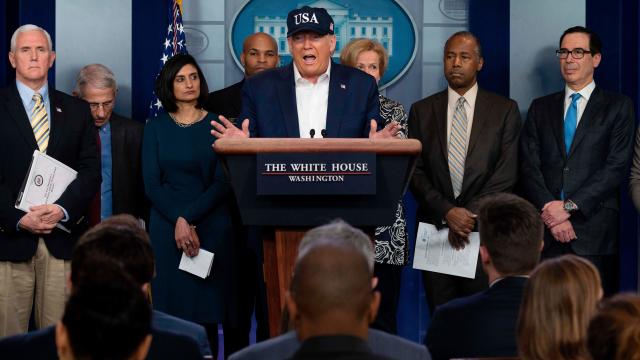Now if only we could get him to stop shaking so many people’s hands.
Members of the White House’s Coronavirus Task Force led a press conference on Sunday to discuss increased precautionary measures amid the ongoing pandemic, which the U.S. president recently declared a U.S. national emergency. According to infectious disease expert Dr. Anthony Fauci, we have not yet “reached peak” of the outbreak despite surpassing more than 2,600 confirmed cases and 50 deaths to date.
“We will see more cases and more suffering and death, predominantly among the vulnerables in our society,” he added, i.e. older individuals with chronic health conditions and people who are immunocompromised.
At the event, President Donald Trump announced he’d finally been screened for COVID-19, the disease caused by the novel coronavirus, after previously downplaying concerns that he should be tested despite coming into contact with multiple people who were later diagnosed with the virus.
“I also took the test last night. I decided I should based on the press conference yesterday,” Trump said. A White House physician later confirmed that Trump did not test positive for the virus. U.S. Vice President Mike Pence also said he and his wife would receive tests for COVID-19 today, though results have not yet been announced.
An attendee of last month’s Mar-a-Lago hotel have received similar diagnoses.
These instances have been fresh on many people’s minds while Trump continues his apparent disregard for Centres for Disease Control and Prevention (CDC) guidance against handshaking and other behaviours that could potentially spread the virus. He defended himself at Saturday’s event, calling the gesture simply “a natural reflex,” while also admitting that “shaking hands is not a great thing to be doing right now, I agree.” Yeah, you think?
After receiving unanimous advice from medical professionals, Trump also said he’s extending the 30-day European travel ban to the United Kingdom and Ireland effective midnight ET Monday. Announced earlier this week, this ban previously only blocked travel for foreign nationals from Europe’s Schengen Zone, a group of 26 countries with open borders between them. Americans currently abroad can still return home, though they’ll be directed to land at one of 13 sanctioned airports across the country to undergo screening for the virus.
Public health officials argue that such travel restrictions will do little to curb the outbreak given how thoroughly COVID-19 has spread throughout the country already. Even Trump’s top health expert Fauci echoed this assertion just a few weeks ago, calling travel bans “irrelevant” during a pandemic, before abruptly changing his tune to defend the president’s response.
On Saturday, Trump said the administration’s also discussing travel restrictions “in certain areas” within the country as well, but did not go into any further detail. However, since he makes a lot of off-the-cuff claims that don’t exactly pan out, it’s hard to gauge how seriously officials are considering this option.
Need an example? See: Yesterday’s announcement of an upcoming Google-run, nationwide coronavirus screening site that’s actually neither Google-run nor nationwide. Which Pence inexplicably only seemed to double-down on at Saturday’s press conference.
The president also expressed support for the “very bipartisan” coronavirus relief bill the House approved this weekend. He singled out Treasury Secretary Steve Mnuchin and House Speaker Nancy Pelosi for their success in negotiating the sweeping financial aid package, which includes paid emergency leave, waived copays, and free COVID-19 screenings. The Senate’s expected to vote on it within the next week, he added.
“We’re using the full power of the federal government to defeat the virus,” Trump said.
Despite the president’s vote of confidence, several critics have already begun to raise concerns about the bill’s limited sick leave options that fail to protect the nation’s most vulnerable workers. If passed, this legislation would only require companies with 500 or fewer employees to provide two weeks of paid leave, thus exempting the nation’s largest employers (Amazon, Walmart, most restaurant chains, etc.), many of which have historically skimped on employee benefits.
Sadly, that means millions of employees who already lack sick leave won’t see much of a difference; they’ll simply have to continue hoping their corporation-du-jour is one of the less-soulless ones that’s changing their policies in the face of this pandemic.
